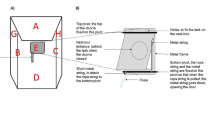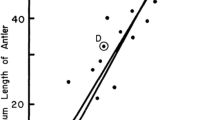Abstract
Across mammals, increased body size is positively associated with lifespan. However, within species, this relationship is inverted. This is well illustrated in dogs (Canis familiaris), where larger dogs exhibit accelerated life trajectories: growing faster and dying younger than smaller dogs. Similarly, some age-associated traits (e.g., growth rate and physiological pace of aging) exhibit accelerated trajectories in larger breeds. Yet, it is unknown whether cognitive performance also demonstrates an accelerated life course trajectory in larger dogs. Here, we measured cognitive development and aging in a cross-sectional study of over 4000 dogs from 66 breeds using nine memory and decision-making tasks performed by citizen scientists as part of the Dognition project. Specifically, we tested whether cognitive traits follow a compressed (accelerated) trajectory in larger dogs, or the same trajectory for all breeds, which would result in limited cognitive decline in larger breeds. We found that all breeds, regardless of size or lifespan, tended to follow the same quadratic trajectory of cognitive aging—with a period of cognitive development in early life and decline in later life. Taken together, our results suggest that cognitive performance follows similar age-related trajectories across dog breeds, despite remarkable variation in developmental rates and lifespan.




Similar content being viewed by others
Data accessibility
The dataset analyzed during the current study is not publicly available due to third party restrictions, but is available from the corresponding author on reasonable request and permission of Canines Inc. Supplementary Materials associated with this article are available online. Code used to complete the described analyses is available at https://github.com/mwatowich/Dog-cognition-across-aging.
References
Adams B, Chan A, Callahan H, Milgram NW (2000) The canine as a model of human cognitive aging. Prog Neuro Psychopharmacol Biol Psychiat 24:675–692
Akaike H (1974) A new look at the statistical model identification. IEEE Trans Automat Control 19:716–723. https://doi.org/10.1109/TAC.1974.1100705
Akdemir D, Okeke UG (2015) EMMREML: fitting mixed models with known covariance structures. R package version 3.1. https://cran.r-project.org/package=EMMREML. Accessed 12 Jun 2019
Alvarez JA, Emory E (2006) Executive function and the frontal lobes: a meta-analytic review. Neuropsychol Rev 16:17–42. https://doi.org/10.1007/s11065-006-9002-x
Austad S (2010) Animal size, metabolic rate, and survival, among and within species. In: Wolf NS (ed) The comparative biology of aging. Springer, Dordrecht, pp 27–41
Bartke A (2017) Somatic growth, aging, and longevity. NPJ Aging Mech Dis 3:1–6. https://doi.org/10.1038/s41514-017-0014-y
Beas BS, Setlow B, Bizon JL (2013) Distinct manifestations of executive dysfunction in aged rats. Neurobiol Aging 34:2164–2174. https://doi.org/10.1016/j.neurobiolaging.2013.03.019
Bizon JL, Woods AG (2009) Animal models of human cognitive aging. Humana Press, Totowa
Chapagain D, Virányi Z, Wallis LJ et al (2017) Aging of attentiveness in border collies and other pet dog breeds: the protective benefits of lifelong training. Front Aging Neurosci 9:1–14. https://doi.org/10.3389/fnagi.2017.00100
Chapagain D, Range F, Huber L, Virányi Z (2018) Cognitive aging in dogs. Gerontology 64:165–171. https://doi.org/10.1159/000481621
Craik FIM, Bialystok E (2006) Cognition through the lifespan: mechanisms of change. Trends Cogn Sci 10:131–138. https://doi.org/10.1016/j.tics.2006.01.007
Diamond A (2013) Executive functions. Annu Rev Psychol 64:135–168. https://doi.org/10.1146/annurev-psych-113011-143750
Duffy DL, Serpell JA (2006) Center for the Interaction of Animals and Society, School of Veterinary Medicine, University of Pennsylvania Non-reproductive Effects of Spaying and Neutering on Behavior in Dogs Proceedings of the Third International Symposium on Non-Surgical Contracepti. In: Proceedings of the Third International Symposium on Non-Surgical Contraceptive Methods for Pet Population Control
Fan R, Olbricht G, Baker X, Hou C (2016) Birth mass is the key to understanding the negative correlation between lifespan and body size in dogs. Aging (Albany NY) 8:3209–3222. https://doi.org/10.18632/aging.101081
Fick LJ, Fick GH, Li Z et al (2012) Telomere length correlates with life span of dog breeds. Cell Rep 2:1530–1536. https://doi.org/10.1016/j.celrep.2012.11.021
Galis F, Van Der Sluij I, Van Dooren TJM et al (2007) Do large dogs die young? J Exp Zool Mol Dev Evol 308:119–126. https://doi.org/10.1002/jez.b
German AJ (2006) The growing problem of obesity in dogs and cats. Am Soc Nutr 136:1940–1946. https://doi.org/10.1093/jn/136.7.1940S
Harada CN, Love MCN, Triebel K (2013) Normal cognitive aging. Clin Geriatr Med 29:737–752. https://doi.org/10.1016/j.cger.2013.07.002
Hare B (2017) Survival of the friendliest: Homo Sapiens evolved via selection for prosociality. Annu Rev Psychol 68:155–185. https://doi.org/10.1146/annurev-psych-010416-044201
Hare B, Tomasello M (2005) Human-like social skills in dogs? Trends Cogn Sci 9:439–444. https://doi.org/10.1016/j.tics.2005.07.003
Harrison XA, Donaldson L, Correa-Cano ME et al (2018) A brief introduction to mixed effects modelling and multi-model inference in ecology. PeerJ. https://doi.org/10.7717/peerj.4794
Hart BL (2001) Effect of gonadectomy on subsequent development of age-related cognitive impairment in dogs. J Am Vet Med Assoc 219:51–56
Head E, Milgram NW, Cotman C (2001) Neurobiological models of aging in the dog and other vertebrate species. Functional neurobiology of aging. Elsevier, Amsterdam, pp 457–468
Healy K, Guillerme T, Cooper N et al (2014) Ecology and mode-of-life explain lifespan variation in birds and mammals. Proc R Soc B Biol Sci 281:20140298–20140298. https://doi.org/10.1098/rspb.2014.0298
Hoffman JM, Creevy KE, Franks A et al (2018) The companion dog as a model for human aging and mortality. Aging Cell. https://doi.org/10.1111/acel.12737
Horschler DJ, Hare B, Call J et al (2019) Absolute brain size predicts dog breed differences in executive function. Anim Cogn. https://doi.org/10.1007/s10071-018-01234-1
Jones P, Chase K, Martin A et al (2008) Single-nucleotide-polymorphism-based association mapping of dog stereotypes. Genetics 179:1033–1044. https://doi.org/10.1534/genetics.108.087866
Jurado MB, Rosselli M (2007) The elusive nature of executive functions: a review of our current understanding. Neuropsychol Rev 17:213–233. https://doi.org/10.1007/s11065-007-9040-z
Kraus C, Pavard S, Promislow DEL (2013) The size–life span trade-off decomposed: why large dogs die young. Am Nat 181:492–505. https://doi.org/10.1086/669665
Lea AJ, Tung J, Zhou X (2015) A flexible, efficient binomial mixed model for identifying differential DNA methylation in bisulfite sequencing data. PLoS Genet 11:1–31. https://doi.org/10.1371/journal.pgen.1005650
MacLean EL, Herrmann E, Suchindran S, Hare B (2017) Individual differences in cooperative communicative skills are more similar between dogs and humans than chimpanzees. Anim Behav 126:41–51. https://doi.org/10.1016/j.anbehav.2017.01.005
Manrique HM, Call J (2015) Age-dependent cognitive in flexibility in great apes. Anim Behav 102:1–6. https://doi.org/10.1016/j.anbehav.2015.01.002
Metcalfe NB, Monaghan P (2003) Growth versus lifespan: perspectives from evolutionary ecology. Exp Gerontol 38:935–940. https://doi.org/10.1016/S0531-5565(03)00159-1
Miklósi Á, Topál J, Csányi V (2004) Comparative social cognition: what can dogs teach us? Anim Behav 67:995–1004. https://doi.org/10.1016/j.anbehav.2003.10.008
Milgram NW, Head E, Weiner E, Thomas E (1994) Cognitive functions and aging in the dog: acquisition of nonspatial visual tasks. Behav Neurosci 108:57–68. https://doi.org/10.1037/0735-7044.108.1.57
Miller DI, Halpern DF (2014) The new science of cognitive sex differences. Trends Cogn Sci 18:37–45. https://doi.org/10.1016/j.tics.2013.10.011
Mongillo P, Scandurra A, Aniello BD, Marinelli L (2017) Effect of sex and gonadectomy on dogs’ spatial performance. Appl Anim Behav Sci 191:84–89. https://doi.org/10.1016/j.applanim.2017.01.017
Moore TL, Killiany RJ, Herndon JG et al (2006) Executive system dysfunction occurs as early as middle-age in the rhesus monkey. Neurobiol Aging 27:1484–1493. https://doi.org/10.1016/j.neurobiolaging.2005.08.004
Müller CA, Mayer C, Dörrenberg S et al (2011) Female but not male dogs respond to a size constancy violation. Biol Lett. https://doi.org/10.1098/rsbl.2011.0287
Nagasawa M, Mitsui S, En S et al (2015) Oxytocin-gaze positive loop and the coevolution of human-dog bonds. Sci Rep 348:333–336
Ostrander EA, Wayne RK, Freedman AH, Davis BW (2017) Demographic history, selection and functional diversity of the canine genome. Nat Rev Genet 18:705–720. https://doi.org/10.1038/nrg.2017.67
Parker HG, Dreger DL, Rimbault M et al (2017) Genomic analyses reveal the influence of geographic origin, migration, and hybridization on modern dog breed development. Cell Rep 19:697–708. https://doi.org/10.1016/j.celrep.2017.03.079
Rodefer JS, Nguyen TN (2008) Naltrexone reverses age-induced cognitive deficits in rats. Neurobiol Aging 29:309–313. https://doi.org/10.1016/j.neurobiolaging.2006.10.005
Salvin HE, Mcgreevy PD, Sachdev PS, Valenzuela MJ (2010) Under diagnosis of canine cognitive dysfunction: a cross-sectional survey of older companion dogs. Vet J 184:277–281. https://doi.org/10.1016/j.tvjl.2009.11.007
Salvin HE, McGreevy PD, Sachdev PS, Valenzuela MJ (2012) The effect of breed on age-related changes in behavior and disease prevalence in cognitively normal older community dogs, Canis lupus familiaris. J Vet Behav 7:61–69
Scandurra A, Alterisio A, Di Cosmo A et al (2019) Ovariectomy impairs socio-cognitive functions in dogs. Animals. https://doi.org/10.3390/ani9020058
Stewart L, Rodriguez K, Call J et al (2015) Citizen science as a new tool in dog cognition research. PLoS ONE 10:e0135176. https://doi.org/10.1371/journal.pone.0135176
Sun S, Zhu J, Mozaffari S et al (2019) Heritability estimation and differential analysis of count data with generalized linear mixed models in genomic sequencing studies. Bioinformatics 35:487–496. https://doi.org/10.1093/bioinformatics/bty644
Szabó D, Gee NR, Miklósi Á (2016) Natural or pathologic? Discrepancies in the study of behavioral and cognitive signs in aging family dogs. J Vet Behav Clin Appl Res 11:86–98. https://doi.org/10.1016/j.jveb.2015.08.003
Tapp PD, Siwak CT, Estrada J et al (2003) Size and reversal learning in the beagle dog as a measure of executive function and inhibitory control in aging. Learn Mem 10:64–73. https://doi.org/10.1101/lm.54403
Verhaeghen P (2011) Aging and executive control: reports of a demise greatly exaggerated. Curr Dir Psychol Sci 20:174–180. https://doi.org/10.1177/0963721411408772
VonHoldt BM, Pollinger JP, Lohmueller KE et al (2010) Genome-wide SNP and haplotype analyses reveal a rich history underlying dog domestication. Nature 464:898–902. https://doi.org/10.1038/nature08837
Wallis LJ, Range F, Müller CA et al (2014) Lifespan development of attentiveness in domestic dogs: drawing parallels with humans. Front Psychol. https://doi.org/10.3389/fpsyg.2014.00071
Wallis LJ, Virányi Z, Müller CA et al (2016) Aging effects on discrimination learning, logical reasoning and memory in pet dogs. Age (Omaha) 38:1–18. https://doi.org/10.1007/s11357-015-9866-x
Zárate S, Stevnsner T, Gredilla R (2017) Role of estrogen and other sex hormones in brain aging. Neuroprotection and DNA repair. Front Aging Neurosci 9:1–22. https://doi.org/10.3389/fnagi.2017.00430
Acknowledgements
We thank Laurie Santos, Richard Wrangham, and all members of the Dognition team for helping create Dognition.com; the citizen scientists who contributed in collecting these data; Sarah Converse for helpful insight with statistical questions; Daniel Promislow for valuable feedback and sharing data vital to this project; Kenny Chiou, India Schneider-Crease, Corbin Johnson, Ian Dowsett, Sierra Sams, Lia Koklic, Grace DeCastro, and Matthew Harrington for their feedback on previous drafts.
Funding
This work was supported by the National Institute of Health Grants R00AG051764, U19AG057377, R01AG060931, R01HD097732. AM was supported by the National Brain Research Program (2017-1.2.1-NKP-2017-00002) and from the ELTE Institutional Excellence Program supported by the National Research, Development and Innovation Office (NKFIH-1157-8/2019-DT).
Author information
Authors and Affiliations
Contributions
MMW, ELM, BH, and NSM conceived of the project. MMW, ELM, and NSM analyzed the data. MMW, ELM, BH, JC, JK, ÁM, and NSM wrote the paper.
Corresponding author
Ethics declarations
Conflict of interest
BH is the founder of Dognition.com and is a member of the Dognition.com Scientific Advisory Board along with JC, JK, and ÁM.
Additional information
Publisher's Note
Springer Nature remains neutral with regard to jurisdictional claims in published maps and institutional affiliations.
Electronic supplementary material
Below is the link to the electronic supplementary material.
Rights and permissions
About this article
Cite this article
Watowich, M.M., MacLean, E.L., Hare, B. et al. Age influences domestic dog cognitive performance independent of average breed lifespan. Anim Cogn 23, 795–805 (2020). https://doi.org/10.1007/s10071-020-01385-0
Received:
Revised:
Accepted:
Published:
Issue Date:
DOI: https://doi.org/10.1007/s10071-020-01385-0




